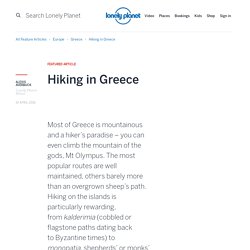

Zagori Greece: A Guide To The Vikos Gorge and Pindos National Park. The Vikos Gorge is one of the most spectacular sights on earth.

It’s nature showing off in all its majesty and the best part about it — there are hardly any tourists! With everyone heading to the islands to laze on beaches, this untouched piece of paradise in the Zagori region of Northern Greece feels about as off the beaten path as you can get (making it one of the top places to visit in Greece). I visited the Pindos National Park in September 2018 during our 6-month campervan trip through Croatia, Montenegro, Serbia, Kosovo, Albania, Macedonia, and Italy. Hiking in Greece. If you’re going to be venturing off the beaten track, a good map is essential.

The best hiking maps are produced by Anavasi (anavasi.gr) and Terrain (terrainmaps.gr). You’ll find EOS (Greek Alpine Club) branches in Epiros, Crete (Greek Mountaineering Association) and Evia (Halkida Alpine Club). Spring (April to May) is the best time for hiking; the countryside is green and fresh from the winter rains, and carpeted with wildflowers. Autumn (September to October) is also a good time. Several companies run organised treks. Meteora Keen walkers will be in their element exploring several days’ worth of monopatia that thread through the rocky monastery-topped spires of Meteora in central Greece. O 09.
Heimatkunde - migrationspolitisches Portal. By Elena MardaDoes history repeat itself after all?

Sullen faces, tired eyes, weak postures, dark clothes and a sense of fear and insecurity in front of a completely different and unknown environment. Waiting in the line, outside of the Selection Committees with a certificate of good health in their hands. March 1960. Worried faces, vivid eyes, healthy bodies, nicely matched clothes and a sense that a part of this belongs to them as well, the bitterness that hope has been kidnapped. Athens 1944: Britain’s dirty secret.
This article is the subject of a column by the readers’ editor.

“I can still see it very clearly, I have not forgotten,” says Títos Patríkios. “The Athens police firing on the crowd from the roof of the parliament in Syntagma Square. The young men and women lying in pools of blood, everyone rushing down the stairs in total shock, total panic.” And then came the defining moment: the recklessness of youth, the passion of belief in a justice burning bright: “I jumped up on the fountain in the middle of the square, the one that is still there, and I began to shout: “Comrades, don’t disperse!
Victory will be ours! “I was,” he says now, “profoundly sure, that we would win.” Even now, at 86, when Patríkios “laughs at and with myself that I have reached such an age”, the poet can remember, scene-for-scene, shot for shot, what happened in the central square of Greek political life on the morning of 3 December 1944. There is no overstating the horror of occupation. “He looked at me and said, ‘Why?’ The Greek Civil War Ends. March 2016: The Greek Civil War, 1946–1949. By Amikam Nachmani The years 1940–1949 were ones of continuous horror for the Greek people.

When the Second World War (WWII) ended in 1945 and the rest of Europe was beginning to rebuild itself, Greece entered into a second war, more vicious than that fought against the Axis powers. If eight percent of the population of seven million had died or been killed during WWII, the Greek civil war (GCW) brought that figure up to ten percent. After the First World War, Greece did not enjoy political stability, enduring repeated coups d’état and dozens of governments. Although Greek communists had been a serious threat to all Greece’s frequently changing governments, the struggle between monarchists and republicans was also bitter. Despite pro-German sympathies the Greek government remained neutral at the outset of World War II.
The period of Greek civil strife is commonly divided into three “rounds”. History of Greece. Greece - The Hidden War - 2.avi. Greek Immigration. Civil War in Greece.